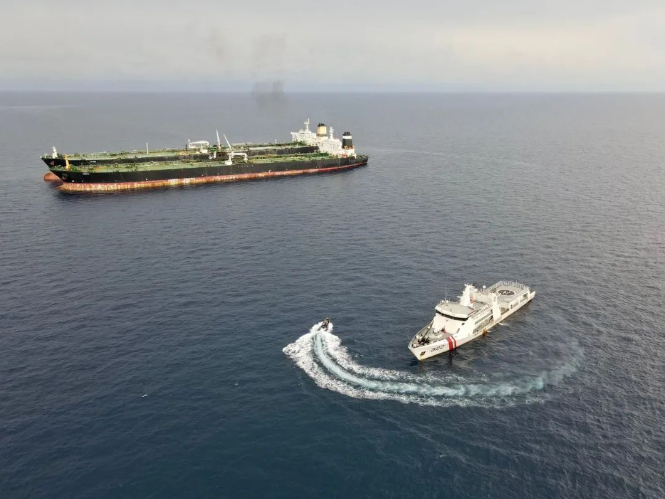Escalation of the game! Us intercepts tankers at sea!
President Donald Trump's administration is considering intercepting and inspecting Iranian oil tankers at sea under an international agreement aimed at curbing the spread of weapons of mass destruction, sources told Reuters.
Trump has vowed to resume a campaign of "maximum pressure" to cut Iran off from the global economy and reduce its oil exports to zero to prevent the country from acquiring nuclear weapons. Mr Trump has imposed two new rounds of sanctions on Iran in the first weeks of his second term, targeting companies and the so-called shadow fleet of ageing tankers that transport crude from sanctioned countries without western insurance.
The moves are largely in line with limited measures put in place during the administration of former President Joe Biden, during which Iran successfully increased its oil exports through sophisticated smuggling networks.

According to the sources, who spoke on condition of anonymity because of the sensitivity of the matter, Trump administration officials are studying ways for Allies to intercept and inspect passing ships in key Asian chokepoints such as the Strait of Malacca and other sea lanes. This will delay the delivery of crude oil to refineries. It could also put the parties involved in brokering the deal at risk of reputational damage and sanctions, the sources said. "You don't have to sink ships or arrest people to have that chilling effect, it's just not worth the risk," said one source. "The delay in delivery... Creates uncertainty about that illicit trade network."
One of the sources said the mechanism could allow foreign governments to intercept Iranian oil shipments at Washington's request, effectively delaying deliveries and hitting the supply chain on which Tehran relies for revenue. The National Security Council, which sets policy at the White House, is studying possible inspections at sea, two sources said. It is unclear whether Washington has reached out to any of the PSI signatories to gauge their willingness to cooperate on the proposal.
John Bolton, who was the lead U.S. negotiator at the time of the initiative's creation, told Reuters that using the initiative to slow Iranian oil exports "makes perfect sense." He noted that the sale of oil "is clearly critical to the Iranian government, both to fund its proliferation activities and to fund its support for terrorism."
The White House National Security Council did not respond to a request for comment. Iran's oil and foreign ministries did not respond to separate requests for comment. Iranian President Massoud Pezechian told the Iranian parliament on March 2 that Trump "once again signed an order to sanction many of our ships in the sea, making it impossible for them to determine how to unload their oil and gas cargoes." He was referring to Trump's latest round of sanctions.
In 2023, under Biden, the United States attempted to intercept at least two shipments of Iranian oil. That prompted Iran to seize foreign ships, including Chevron Corp
CVX.N) chartered a ship, thus pushing up crude prices. Ben Cahill, an energy analyst at the Center for Energy and Environmental Systems at the University of Texas, said the current low-oil price environment gives Trump more options to stop the flow of Iranian oil, from sanctions on tanker companies to ship seizures. "I think if oil prices stay below $75 a barrel, the White House will have more leeway in considering sanctions that affect the supply of oil from Iran and other countries," Cahill said. At $92 a barrel, it's much more difficult to do that."
In the short term, he said, tough U.S. measures could reduce Iran's oil exports by about 75 percent a day,But the longer sanctions remain in place, the less effective they will be, as Iran and buyers devise ways to circumvent them. A quick resumption of oil exports from Iraq's semi-autonomous Kurdistan region would help offset any decline in Iranian exports. Reuters previously reported that the White House was pressuring Iraq to allow Kurdish oil exports to resume or face sanctions along with Iran.
Despite U.S. sanctions in recent years, Tehran's oil export revenue in 2023 was estimated at $53 billion, up from 540 a year earlier, according to the U.S. Energy Information Administration
$100 million, most of it from trade with China. Iran relies on oil exports to China for vital revenue. Russia, facing restrictions on oil exports and broader Western sanctions, is also focusing on shipping oil to buyers in China and India.
Finland and other Nordic countries have warned in recent months of the dangers of ships sailing close to their shores, posing environmental risks to their shores in the event of an accident resulting in an oil spill. Although European countries have talked about inspections of ships carrying Russian oil suspected of not carrying valid insurance, little has been done, and no inspections have been proposed for ships carrying Iranian oil.
声明:转载此文是出于传递更多信息之目的。若有来源标注错误或侵犯了您的合法权益,请作者持权属证明与本网联系,我们将及时更正、删除,谢谢。
2025-03-10来源:航运在线
Recent news

Escalation of the game! Us intercepts tankers at sea!

Boat, boat, boat! More than 60 new ships are under construction in Shanghai's three big Ships

Will the US impose 60% tariffs on all Chinese goods? Response of the Ministry of Foreign Affairs

Maersk set up an international transshipment center in Lingang, Shanghai

"Sea Hercules" and new Chinese ships Hudong China opened a new beginning of the New Year ship delivery

More than 500 ships! Ningde time on board

Swim upstream! Chinese shipping company to carry out Red Sea express


